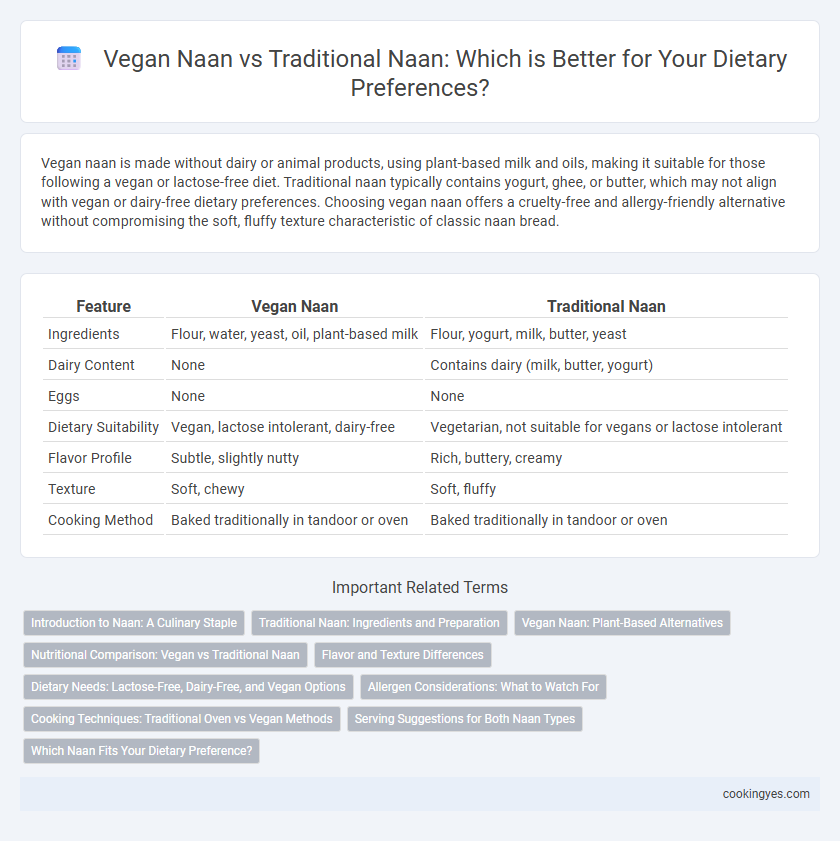Vegan naan is made without dairy or animal products, using plant-based milk and oils, making it suitable for those following a vegan or lactose-free diet. Traditional naan typically contains yogurt, ghee, or butter, which may not align with vegan or dairy-free dietary preferences. Choosing vegan naan offers a cruelty-free and allergy-friendly alternative without compromising the soft, fluffy texture characteristic of classic naan bread.
Table of Comparison
| Feature | Vegan Naan | Traditional Naan |
|---|---|---|
| Ingredients | Flour, water, yeast, oil, plant-based milk | Flour, yogurt, milk, butter, yeast |
| Dairy Content | None | Contains dairy (milk, butter, yogurt) |
| Eggs | None | None |
| Dietary Suitability | Vegan, lactose intolerant, dairy-free | Vegetarian, not suitable for vegans or lactose intolerant |
| Flavor Profile | Subtle, slightly nutty | Rich, buttery, creamy |
| Texture | Soft, chewy | Soft, fluffy |
| Cooking Method | Baked traditionally in tandoor or oven | Baked traditionally in tandoor or oven |
Introduction to Naan: A Culinary Staple
Naan, a traditional Indian flatbread, is typically made with yogurt and ghee, making it unsuitable for vegan diets. Vegan naan substitutes dairy ingredients with plant-based alternatives such as coconut yogurt and olive oil, catering to dietary preferences without compromising texture or taste. Both versions serve as a versatile accompaniment to various dishes, highlighting the bread's cultural significance and adaptability in global cuisine.
Traditional Naan: Ingredients and Preparation
Traditional naan is made from a combination of white flour, yogurt, milk, sugar, yeast, and ghee or butter, which imparts a rich and soft texture. The dough is traditionally prepared by allowing it to ferment, resulting in a slightly tangy flavor before being cooked in a tandoor oven at high temperatures for a characteristic char and puff. These ingredients and preparation methods contribute to the distinctive taste and moist, fluffy consistency of authentic naan bread.
Vegan Naan: Plant-Based Alternatives
Vegan naan uses plant-based ingredients like almond milk, coconut yogurt, and olive oil to replace traditional dairy products, making it suitable for vegan and lactose-intolerant diets. These alternatives maintain the soft texture and rich flavor of traditional naan while eliminating animal-derived components. Incorporating vegan naan into meals supports ethical eating and aligns with sustainable food choices without sacrificing authenticity.
Nutritional Comparison: Vegan vs Traditional Naan
Vegan naan typically replaces dairy ingredients like yogurt and ghee with plant-based alternatives such as coconut oil and almond milk, resulting in lower saturated fat and cholesterol levels compared to traditional naan. Traditional naan contains more protein and calcium due to the use of dairy, but vegan naan offers higher fiber content when made with whole wheat flour or added seeds. Nutritionally, vegan naan suits those seeking reduced saturated fat intake and plant-based diets, while traditional naan provides a richer source of certain vitamins and minerals from animal-derived components.
Flavor and Texture Differences
Vegan naan replaces dairy ingredients like yogurt and ghee with plant-based alternatives, resulting in a lighter, slightly tangier flavor compared to the rich, buttery taste of traditional naan. The texture of vegan naan tends to be softer and less flaky, as it lacks the fats from dairy that create the signature pillowy layers in traditional varieties. Both versions offer a deliciously chewy base, but vegan naan appeals to those seeking a dairy-free option without sacrificing the essential naan experience.
Dietary Needs: Lactose-Free, Dairy-Free, and Vegan Options
Vegan naan is crafted without dairy ingredients such as ghee or yogurt, making it an ideal choice for lactose-free and dairy-free diets. Traditional naan typically contains dairy components like butter or yogurt, which can trigger lactose intolerance or dietary restrictions. Choosing vegan naan ensures adherence to vegan and allergen-free dietary preferences without compromising the distinctive texture and flavor of this popular Indian flatbread.
Allergen Considerations: What to Watch For
Vegan naan typically avoids dairy and eggs, reducing common allergens like milk proteins and cholesterol, making it suitable for lactose-intolerant and vegan individuals. Traditional naan often contains yogurt, butter, and sometimes eggs, which can trigger allergies to dairy and eggs. When selecting naan for allergen-sensitive diets, check ingredients for gluten, dairy, and egg content, and consider certified allergen-free or gluten-free options if needed.
Cooking Techniques: Traditional Oven vs Vegan Methods
Traditional naan is typically cooked in a tandoor oven, which imparts a distinctive smoky flavor and crisp exterior, while vegan naan often utilizes stovetop or oven baking methods to accommodate plant-based ingredients without sacrificing texture. The tandoor's high heat creates characteristic charred spots and air bubbles, crucial to naan's authentic taste, whereas vegan recipes may incorporate alternative fats like coconut oil or vegan butter and rely on skillets or convection ovens. These cooking adaptations ensure vegan naan maintains a soft interior and slightly crispy crust, aligning with dietary preferences while preserving the essence of traditional naan techniques.
Serving Suggestions for Both Naan Types
Vegan naan pairs exceptionally well with plant-based curries, roasted vegetables, and vegan dips like hummus or baba ganoush, enhancing the flavor while accommodating dietary restrictions. Traditional naan complements rich dishes such as butter chicken, lamb curry, and paneer tikka, offering a soft, buttery accompaniment that balances the savory sauces. Both types serve as versatile sides or wraps, making them ideal for diverse culinary experiences regardless of dietary preference.
Which Naan Fits Your Dietary Preference?
Vegan naan is made without dairy ingredients like yogurt or ghee, making it suitable for those following a plant-based or lactose-free diet. Traditional naan contains butter or ghee and sometimes yogurt, providing a richer flavor but not suitable for vegan or dairy-free preferences. Choosing between vegan and traditional naan depends on dietary restrictions, taste preferences, and nutritional needs, with vegan naan offering a compassionate and allergy-friendly option.
Vegan Naan vs Traditional Naan for dietary preference Infographic

 cookingyes.com
cookingyes.com